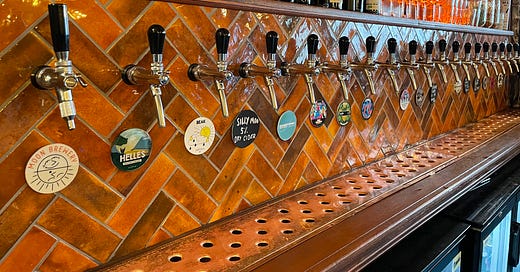By Phil Mellows
Last week pub trade magazine the Morning Advertiser (MA) reported that craft beer volume sales in the UK, according to respected research organisation CGA by NIQ, fell by 5.3%, faster than the whole beer market, which was down by 2.1%.
This might suggest that rather than delivering its promise of injecting a healthy dose of innovation and excitement into British brewing, craft is losing its relevance. But these topline figures seldom tell the whole story.
As the market has matured, a gap has opened between what you could call ‘mainstream craft’ and the kind of cutting-edge beers that made craft such a vibrant category.
Brands such as Beavertown Neck Oil and Camden Hells have proliferated on bars across the country thanks to their acquisition by global brewing giants Heineken and AB Inbev, respectively. They have their place and arguably provide a bridge into craft for many people. But their ubiquity means they don’t have the same aura as beers brewed by smaller, independent companies.
And it seems to me that pubs, bars and taprooms that have grasped this difference, and chosen to focus on the more adventurous end of craft beer, are doing okay. At least that was my experience researching our book, Beer Breaks in Britain.
So, intrepid beer tourist that I am, I took a stroll across the road to one of my Brighton locals, the Independent Taproom and Beer Shop for some in-depth investigation.
The name celebrates the freedom owner Matt Russell found when he bought the corner pub, previously the Walmer Castle, from his brewery landlord. Finally, he could choose the beers he loved and could honestly recommend to his customers.
It also reflects the source of the range of craft beers on sale here, from 20 draught taps and a bank of can-stuffed fridges. All are from small independent brewers.
“If I were to start selling the kind of beers you find in most pubs, I’d lose half my customers,” says Matt. He believes that by getting involved in craft, big brewers have, “devalued the product”, and that explains the decline.
His formula has been a successful one. At the end of 2023, Matt opened a second pub, the Rook, pictured, in the city centre. Not that it’s easy. In the economic circumstances he’s happy to be just a little ahead of last year. And it’s hard work. Running to stand still, almost.
“The beer has to be good, of course, but we also have to keep people interested, with variety and change. I do a lot of research and listen to our customers, find out what they want.”
Right now, that means stocking beers from Azvex in Liverpool, Floc in Canterbury, Rivington in Lancashire, Howling Hops in Hackney, and the ever-reliable Verdant in Cornwall. Recently, they’ve been joined by the hard-to-source Wild Horse, which I discovered while researching Llandudno, and State of Kind in Wigan, which is a new one on me.
Matt has the advantage, too, of having a nano brewery, called Moon, upstairs at the Indy, which can experiment with different styles to see what’s working. It’s just produced a Kolsch-style beer for International Women’s Day.
It also means following the trend towards alcohol-free beers. This isn’t a matter of stocking a token AF or two. The pub had three on tap in January plus 20 different cans.
If all the pubs in Brighton were free to choose the beers they wanted, craft would be soaring away, Matt believes. At the moment, it’s “a niche, but it’s a growing niche, and I’m looking for pub number three,” he revealed.
It’s vindication of the campaign by the Society of Independent Brewers and Associates to make people aware of the difference between ‘true craft’ and the crafty beers produced by the global giants, and indicates that this isn’t just a moral question, there’s potentially a healthy market for it. Indie Beer Week, announced for April 11 – 20, will be an opportunity to celebrate that fact.
And the venues listed in Beer Breaks in Britain certainly lean heavily, if not exclusively, towards the independent. After all, you don’t want to be travelling to distant destinations to drink beers you can find at any old pub at home.




Thank you for sharing your keen insights.